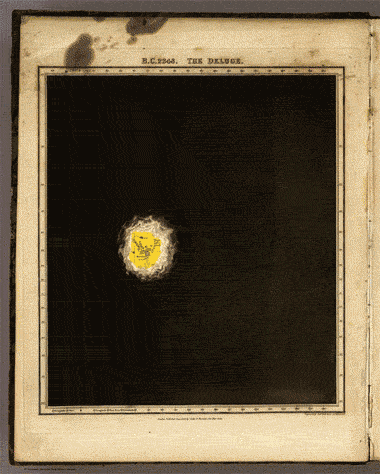In 01830, English journalist Edward Quin created a historical atlas that illustrated our expanding knowledge of the world. Depicting a time span that stretched from 02348 BC to 01828 AD, or more than four millennia, each successive map showed a slightly larger piece of bright, colorful land, surrounded by the ominous clouds of the unknown.
Slate recently compiled these maps into a single, chronological GIF (high res version) that highlights the sense of dynamism, evolution, and enlightenment that Quin sought to convey. As each image follows its predecessor, the viewer sees a menacing black sky gradually receding until the modern world is finally revealed.
The atlas, which belongs to Long Now Board member David Rumsey‘s map collection, certainly tells a story – though it may not be the one Quin sought to tell. To a modern audience, these maps are less an account of expanding geographic knowledge than a history of Western thinking about the rest of the world. The maps depict a decidedly European perspective, beginning with the biblical world of Noah’s Ark, and progressing, via ages of imperial conquest (Alexander the Great, the Roman Empire, and finally colonialism), to incorporate the entire globe. As Slate summarizes:
To say that an area of the world was “known” was, for Quin, the same as saying that it was “known” by Greek, Roman, or European cartographers. A set of such maps drawn from the perspective of the Aztecs, Egyptians, or Chinese would, of course, look quite different.
For more information about the atlas, please visit David Rumsey’s online collection, where each map – with descriptions by Quin – can be examined on its own.
